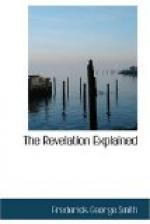This Jesus is he who will come again, not in humiliation and suffering, but in glory and honor; not as a Lamb to shed his blood for the sins of the world, but as the Lion of the tribe of Juda, with infinite power and majesty, causing all the kindreds of earth to wail because of him. The blasphemous Jews, who clamored for his crucifixion; Pilate, who delivered him up; and the Roman soldiery, who drove the nails and pierced his side, producing a death of greatest ignominy—all will see him when he comes. But while the proud enemies of God and the cruel oppressors of his saints are overwhelmed with terror at the sight of His person, the saints of all ages will shout for joy, saying, “Even so. Amen.” “The judgments of the Lord are true and righteous altogether.” In the face of this awful truth, how dare men assert that the second advent will usher in a thousand years of peace and tranquility, during which time the wicked will lie in their graves, when God’s word declares that every eye shall see him when he comes?
The present description of Christ closes with the statement that he is the Alpha and the Omega, which, being the first and last letters of the Greek alphabet, mean the same as “the beginning and the ending”; while the whole concludes with the statement that he is the one “which is, and which was, and which is to come, the Almighty”—which is the same as the description given of God in verse 4. Nothing in addition to this could be ascribed to Christ. Every attribute with which the Deity himself is invested is here ascribed to Jesus Christ. If our Savior is anything more than this description declares him to be, it is beyond the reach of our finite minds to comprehend. The sacred writers everywhere speak of him as a being worthy of worship and praise; and this fact, taken in connection with the universal proneness of men to take the honor from God and to give it to those who are no gods, is a convincing proof that Christ is God and, as such, is worthy of all honor and praise; and nowhere is there given in regard to Christ a warning caution such as John received from the angel at whose feet he fell to worship—“See thou do it not ... worship God.”
9. I John, who also am your brother, and companion in tribulation, and in the kingdom and patience of Jesus Christ, was in the isle that is called Patmos, for the word of God, and for the testimony of Jesus Christ.
10. I was in the Spirit
on the Lord’s day, and heard behind me a
great voice, as of a trumpet,
11. Saying, I am Alpha and Omega, the first and the last: and, What thou seest, write in a book, and send it unto the seven churches which are in Asia; unto Ephesus, and unto Smyrna, and unto Pergamos, and unto Thyatira, and unto Sardis, and unto Philadelphia, and unto Laodicea.
At the time the Revelation was given, John was a prisoner in the Isle of Patmos (now called Patmo or Patino),




